Serving 535 students in grades Prekindergarten-8, P.s. 66 ranks in the bottom 50% of all schools in New York for overall test scores (math proficiency is bottom 50%, and reading proficiency is bottom 50%).
The percentage of students achieving proficiency in math is 24% (which is lower than the New York state average of 46%). The percentage of students achieving proficiency in reading/language arts is 35% (which is lower than the New York state average of 49%).
The student:teacher ratio of 11:1 is equal to the New York state level of 11:1.
Minority enrollment is 97% of the student body (majority Black), which is higher than the New York state average of 60% (majority Hispanic and Black).
Quick Stats (2025)
- Grades: Prekindergarten-8
- Enrollment: 535 students
- Student:Teacher Ratio: 11:1
- Minority Enrollment: 97%
- Overall Testing Rank: Bottom 50% in NY
- Math Proficiency: 24% (Btm 50%)
- Reading Proficiency: 35% (Btm 50%)
- Science Proficiency: 50-54% (Btm 50%)
- Source: National Center for Education Statistics (NCES), NY Dept. of Education
School Overview
P.s. 66's student population of 535 students has declined by 33% over five school years.
The teacher population of 47 teachers has declined by 11% over five school years.
Grades Offered
Grades Prekindergarten-8
(offers virtual instruction)
(offers virtual instruction)
Total Students
535 students
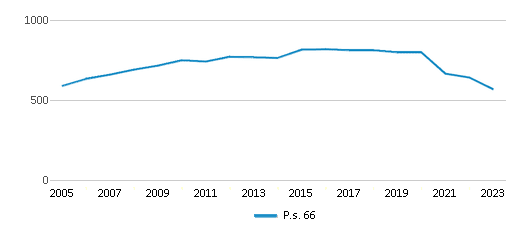
Gender %
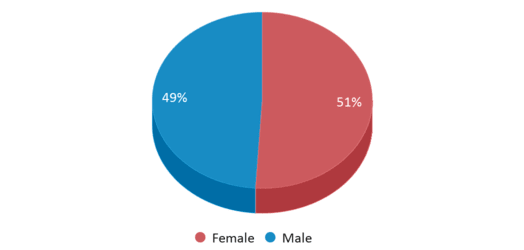
Total Classroom Teachers
47 teachers
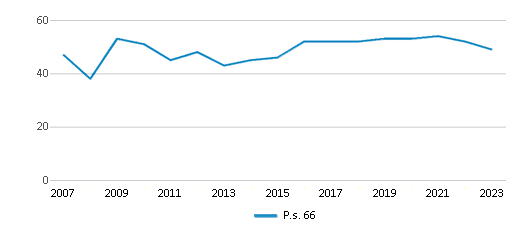
Students by Grade
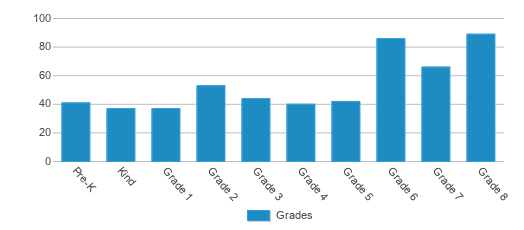
School Rankings
P.s. 66 ranks within the bottom 50% of all 4,377 schools in New York (based off of combined math and reading proficiency testing data).
The diversity score of P.s. 66 is 0.37, which is less than the diversity score at state average of 0.72. The school's diversity has stayed relatively flat over five school years.
Overall Testing Rank
#3469 out of 4377 schools
(Bottom 50%)
(Bottom 50%)
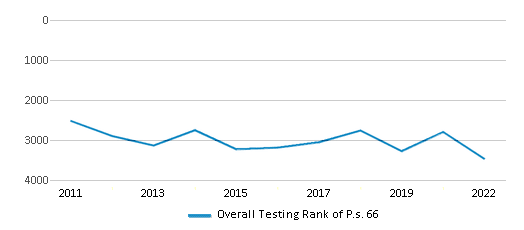
Math Test Scores (% Proficient)
24%
46%
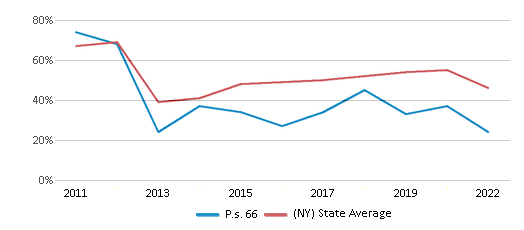
Reading/Language Arts Test Scores (% Proficient)
35%
49%
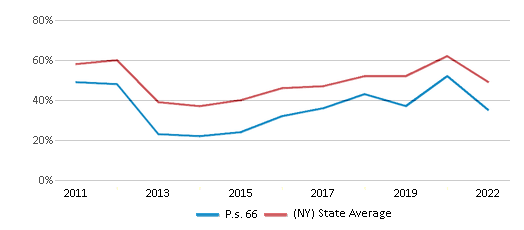
Science Test Scores (% Proficient)
50-54%
78%
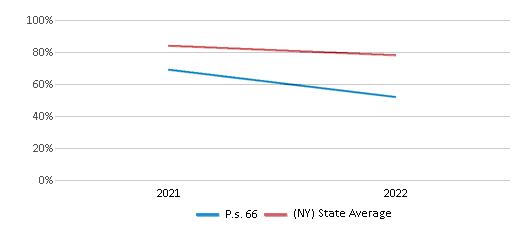
Student : Teacher Ratio
11:1
11:1
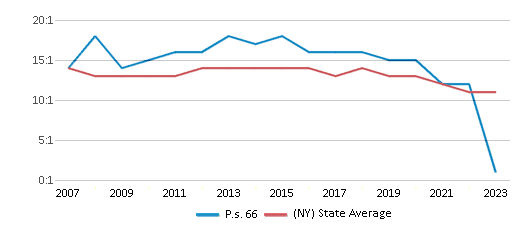
American Indian
2%
1%
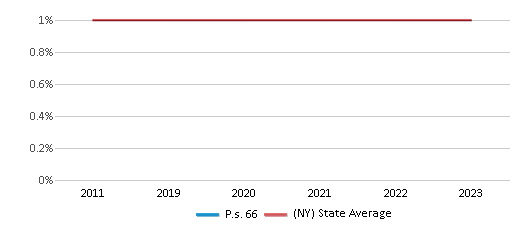
Asian
1%
10%
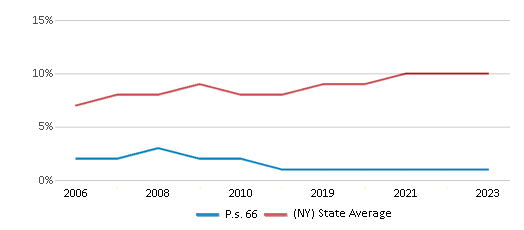
Hispanic
14%
30%
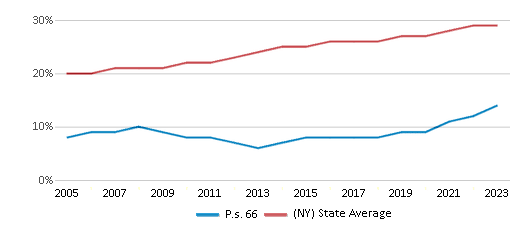
Black
78%
16%
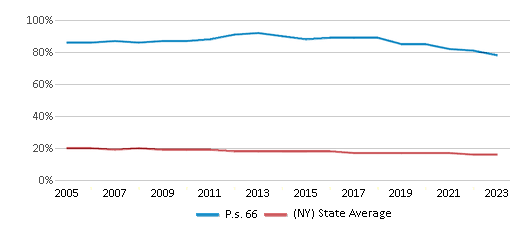
White
3%
40%
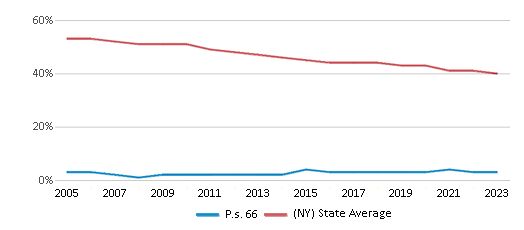
Hawaiian
1%
n/a
Two or more races
1%
3%
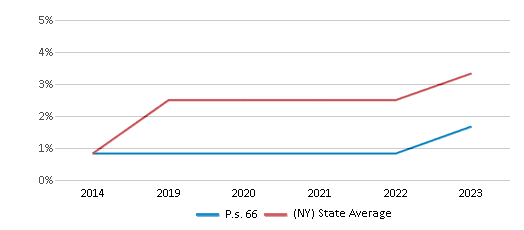
All Ethnic Groups
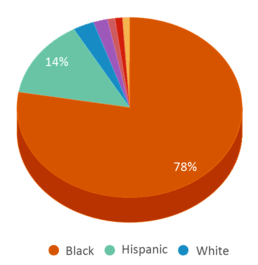
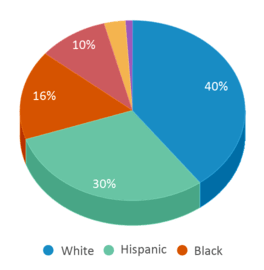
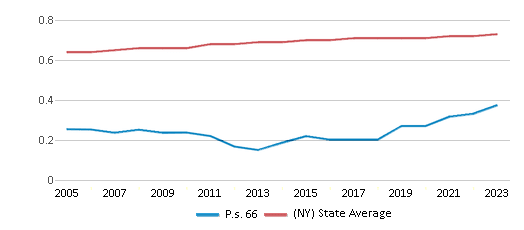
Participates in the National School Lunch Program (NSLP)
Yes
Eligible for Free Lunch
76%
54%
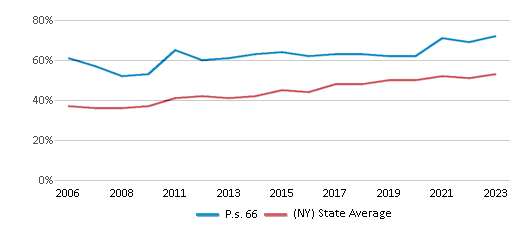
Eligible for Reduced Lunch
4%
3%
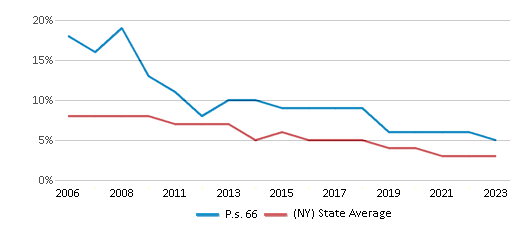
School Statewide Testing
School District Name
Source: National Center for Education Statistics (NCES), NY Dept. of Education
Profile last updated: 02/09/2025
Frequently Asked Questions
What is P.s. 66's ranking?
P.s. 66 is ranked #3469 out of 4,377 schools, which ranks it among the bottom 50% of public schools in New York.
What percent of students have achieved state testing proficiency in math and reading?
24% of students have achieved math proficiency (compared to the 46% NY state average), while 35% of students have achieved reading proficiency (compared to the 49% NY state average).
How many students attend P.s. 66?
535 students attend P.s. 66.
What is the racial composition of the student body?
78% of P.s. 66 students are Black, 14% of students are Hispanic, 3% of students are White, 2% of students are American Indian, 1% of students are Asian, 1% of students are Hawaiian, and 1% of students are Two or more races.
What is the student:teacher ratio of P.s. 66?
P.s. 66 has a student ration of 11:1, which is equal to the New York state average of 11:1.
What grades does P.s. 66 offer ?
P.s. 66 offers enrollment in grades Prekindergarten-8 (offers virtual instruction).
What school district is P.s. 66 part of?
P.s. 66 is part of New York City Geographic District #18 School District.
In what neighborhood is P.s. 66 located?
P.s. 66 is located in the Canarsie neighborhood of Brooklyn, NY. There are 23 other public schools located in Canarsie.
School Reviews
1 2/17/2020
This school is terrible! Teachers don't care about students, this school in general is bad.
4 8/26/2019
My son (now 27) was in the first graduating class. I didn't care much for the Principal at that time. However, the Principal has changed and the new Principal is trying very hard to erase the negativity the first Principal left at the school. My daughter (8) and my other son (7) now attend the school (both in the Scholars program). They enjoy all of the teachers they had and currently have at the school. Parents should seriously consider applying to this combination school (K-8).
5 5/9/2017
They tought me very well we had our fun and good times and we also had our hard studies. Thanks from an old fellow classmate in 5th grade
5 2/26/2016
I believe that's a great school, with good performances but if they let gossips feed their school they will lose their legacy and integrity. My advice is dont kill the fun of learning for children. They need to stop the spread of gossips.
Review P.s. 66. Reviews should be a few sentences in length. Please include any comments on:
- Quality of academic programs, teachers, and facilities
- Availability of music, art, sports and other extracurricular activities
Recent Articles

What Is A Charter School?
Explore the world of charter schools in this comprehensive guide. Learn about their history, how they operate, and the pros and cons of this educational innovation. Discover key facts about charter schools, including admission policies, demographics, and funding, as well as what to look for when considering a charter school for your child.

10 Reasons Why High School Sports Benefit Students
Discover the 10 compelling reasons why high school sports are beneficial for students. This comprehensive article explores how athletics enhance academic performance, foster personal growth, and develop crucial life skills. From improved fitness and time management to leadership development and community representation, learn why participating in high school sports can be a game-changer for students' overall success and well-being.

February 05, 2025
Understanding the U.S. Department of Education: Structure, Impact, and EvolutionWe explore how the Department of Education shapes American education, from its cabinet-level leadership to its impact on millions of students, written for general audiences seeking clarity on this vital institution.







